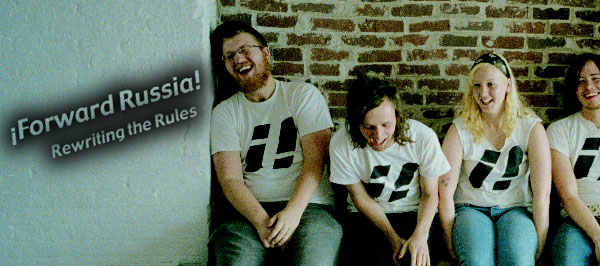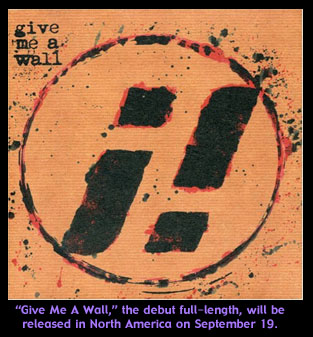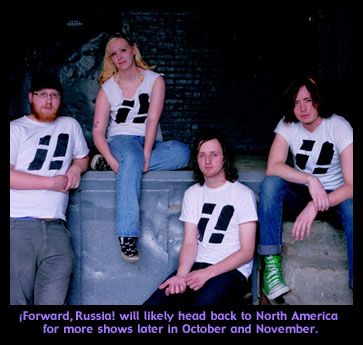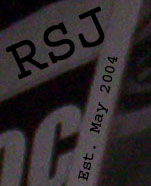 There's DIY like every punk band that's ever proved their credibility through sleeping on floors and forgoing any sort of
monetary reward. And then there's DIY like starting your own label when you can't find one to sign you, putting out your
own records and those of other local talent, and then playing constantly to support said material. Leeds natives ¡Forward
Russia! are the latter example.
Not to take anything away from every good punk band that's ever set out to play basements, but ¡Forward Russia! is set
on taking the concept of DIY and making it professional. And they've seen it pay off in spades over the past year with their
dance-tinged post-punk garnering a Top 40 single in the UK, wildly enthusiastic gigs, and growing support for their upstart
label, Dance To The Radio. Now, with hometown success in the bag, vocalist Tom Woodhead speaks to RSJ as they set out to
conquer America, having landed a deal with Mute Records that will see the US release of their full-length debut, "Give
Me A Wall," on September 19.
Rock Star Journalism: Given the band's modest beginnings, does it seem strange to now be promoting a big North American release,
or did you always envision this for yourself?
Tom Woodhead: Things in other countries, you don't really think about until they happen, and it is quite strange to suddenly
being doing all this stuff all over the world. You kind of get used to it; after awhile you just get in this little bubble
where you don't really know what's going on, you just kind of go along with it.
RSJ: Since you're already doing quite well at home, how much does it even matter to you whether the US picks up on it
or not?
TW: I think it all matters a lot. We really want to do well all over the world, and we want people to hear the music.
In an ideal world you could play everywhere, but, obviously, that's not the case.
RSJ: It seems like the Leeds scene has exploded over the past year -- do you think there's better bands now, or have people
just finally started to take notice?
TW: I think there are better bands than there were four or five years ago. Everyone's getting better, and everyone's
learning how to be in a band, how to write better songs. Having more fun with it as well, just going out there and doing
it instead of waiting for people to come and do stuff for them. In general, Leeds is a pretty great place to be at the moment.
RSJ: Do you think that's because the success of one band inspires another?
TW: There's probably an element of that, but I think it's more bands helping each other out and giving each other advice.
Cooperating with each other -- the general spirit in Leeds is really good at the moment.
 RSJ: You've done very well spreading the word about the band -- what have you found to be the best tool for promotion?
TW: I think you can't discount anything. It's about all the different things. Like, people talk about the internet a
lot, but that's just one side of it. I think word of mouth is very important. Fanzines and stuff can be very important.
Just sending demos off to anyone who asks and not being lazy about it is really important. The biggest thing for us has
just been playing gigs all around the country. When you start touring full time, once you can do all gigs, I think that's
probably the biggest promotional tool you can have.
RSJ: Tell me how you define the term DIY, apart from what the letters stand for. I thought it was interesting that [guitarist
and Dance To the Radio founder] Whiskas once made mention of how DIY doesn't have to be synonymous with low quality.
TW: The DIY thing is kind of strange because it means different things to different people, especially in Britain. Like,
there's a big scene that will call themselves the DIY scene who are more about not making any money off the music at all,
playing through PAs the size of matchboxes in rooms above pubs and stuff like that. And it' cool, and there are a lot of
really great bands who make music and live that way, but that's not what we're really about. The "Do It Yourself"
thing was more out of necessity than out of particularly wanting to do it that way. We had songs, we found that we could
put them out ourselves, so we did. No one else was offering to put it out at the time. So, it's more like well, if we can
do it ourselves, we may as well, cause we'll do as good a job as anyone at the moment.
RSJ: Are you involved at all with the label, or is that mostly Whiskas' domain?
TW: It's pretty much Whiskas. We all hear about it all, and we all give our opinions, but Whiskas and a few other guys
-- they're the [label] people, really. Whiskas more makes the big decisions now, but there's a team of people at the label,
who are really awesome, that do the day-to-day running and everything. It's all going really well. I was just down at the
office today, and everything seems to be going quite smoothly for the label at the moment.
RSJ: You and the label have received a lot of support from magazines like NME; how instrumental do you think that's been
in getting you noticed?
TW: Obviously, NME's one of the most popular specialist music magazines in the country. If it's writing about you, then
you're going to have a lot more people hearing about you. Though, I think it's very odd how you kind of get pigeonholed as
being an "NME band" if you get written up in the NME. Which is kind of ridiculous, and you get compared to a lot
of other NME bands, even if you don't sound like them. But I guess that's just the way the British music press works and
has done for quite a long time. I mean, it's cool, they've obviously helped us a lot. There are some really good people
there, and there are some dickheads there. But there are in most things in the music industry -- there's some really good
people and some dickheads.
 RSJ: You're known for having very intense live shows, some of which had to be stopped because of crowd control issues.
TW: Yeah, we've had to once or twice. Quite often we have to ask people to calm down cause people are getting a bit hurt
in the front. There was one show where we did have to stop in the middle of the song cause loads of people were on the stage
and all our instruments just fell over, my synth was broken and nothing was working. So, we had to stop that show, which
was like our first solo headlining show in London. But it's all good fun; we have a good time. We just try to put everything
we can into performing, and hopefully that impacts the audience in the same way.
RSJ: Do you find that you use that energy from the audience to feed your performance?
TW: You can do, yeah. It can be completely different every time. Sometimes you can get completely energized without
having any audience at all; you're just feeling the music. Sometimes you're not quite feeling it, and the audience can sort
of bring you round. It's a strange dynamic; there's not really any particular formula to it. But definitely, the audience
can energize you, and I would hope vice versa.
RSJ: What is your policy on fans taping shows and trading them online?
TW: That's fine; I don't have any problem with that. I honestly don't see why any band would have a problem with that.
It's not like they're stealing or anything; they're just taking something they've heard and sharing it with their friends.
I think you'd have to be a bit of a prick to have any kind of problem with that.
RSJ: Have you been happy with the way the couple of US shows you've played have gone?
TW: Yeah, really happy! Especially the New York one we did; that was all sold out with people going mad in the crowd.
It's really ridiculous when we go to gigs in America, and there's still some people who seem to know the songs and are singing
along. That just seems absolutely mental to me; I can't really understand how that happens, but it's really great just to
see so many people into it.
RSJ: Is it still the plan to do more touring in North America in September/October?
TW: I think it's more likely to be November/December that we're coming back. Cause we've just got a six week European
tour booked for September/October, so that's pretty much off limits now.
RSJ: You've been compared a bit, in the American press at least, to some post-hardcore bands like At the Drive In and
The Blood Brothers. Is this a music scene you were ever interested in?
 TW: Yeah, definitely. It's quite refreshing being compared to those bands because we don't ever really get compared to them
in Britain, but it's a thing we're really interested in. The music press in Britain, they tend to concentrate on the Gang
of Four, post-punk side of it, rather than the harder stuff. I think that's just cause that's what's going on in the UK at
the moment. Whereas, I guess, in America harder music's always been more popular, so it makes more sense to compare it to
that. But it's nice to have a different comparison.
RSJ: If you were to describe the sound you hope to achieve, what would you say?
TW: I would like it to sound like every band I've ever heard at the same time and every band I've ever liked at the same
time. You know, you like all these bands, and I always thought it would be great if there was a band that sounded like all
those bands at once. Then, I could just listen to that band; I wouldn't have to listen to anything else (laughs). That's
kind of what I hope we're trying to do anyway.
RSJ: Where do you envision ¡Forward Russia! in a year's time?
TW: Just continuing, progressing, doing more and more better gigs. I just want to keep going as we have because it's
been amazing so far. I want to make a really amazing second album that we can be proud of.
RSJ: Is there anything that you think you will specifically do differently on this next album?
TW: Not really. We're trying not to talk about it too much so that we don't inhibit ourselves in any way. We're just
trying to write as it comes naturally, but try and avoid cliché, which is pretty much what we've always done.
Got something to say about this feature? E-mail us.
|

